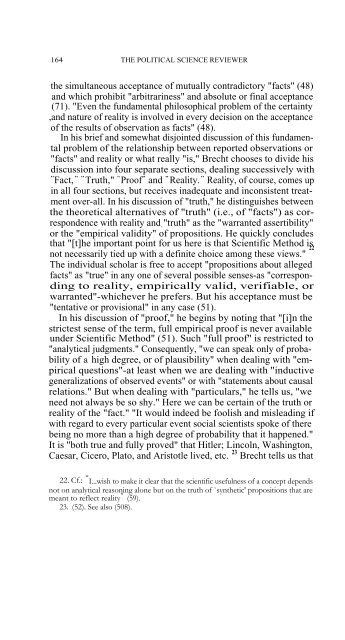ARNOLD BRECHT'S POLITICAL THEORY REVISITED Political ...
ARNOLD BRECHT'S POLITICAL THEORY REVISITED Political ...
ARNOLD BRECHT'S POLITICAL THEORY REVISITED Political ...
You also want an ePaper? Increase the reach of your titles
YUMPU automatically turns print PDFs into web optimized ePapers that Google loves.
164 THE <strong>POLITICAL</strong> SCIENCE REVIEWER<br />
the simultaneous acceptance of mutually contradictory "facts" (48)<br />
and which prohibit "arbitrariness" and absolute or final acceptance<br />
(71). "Even the fundamental philosophical problem of the certainty<br />
,and nature of reality is involved in every decision on the acceptance<br />
of the results of observation as facts" (48).<br />
In his brief and somewhat disjointed discussion of this fundamental<br />
problem of the relationship between reported observations or<br />
"facts" and reality or what really "is," Brecht chooses to divide his<br />
discussion into four separate sections, dealing successively with<br />
" Fact, " " Truth," " Proof " and " Reality. " Reality, of course, comes up<br />
in all four sections, but receives inadequate and inconsistent treatment<br />
over-all. In his discussion of "truth," he distinguishes between<br />
the theoretical alternatives of "truth" (i.e., of "facts") as correspondence<br />
with reality and, "truth" as the "warranted assertibility"<br />
or the "empirical validity" of propositions. He quickly concludes<br />
that "[t]he important point for us here is that Scientific Method is<br />
not necessarily tied up with a definite choice among these views." 22<br />
The individual scholar is free to accept "propositions about alleged<br />
facts" as "true" in any one of several possible senses-as "corresponding<br />
to reality, empirically valid, verifiable, or<br />
warranted"-whichever he prefers. But his acceptance must be<br />
"tentative or provisional" in any case (51).<br />
In his discussion of "proof," he begins by noting that "[i]n the<br />
strictest sense of the term, full empirical proof is never available<br />
under Scientific Method" (51). Such "full proof" is restricted to<br />
"analytical judgments." Consequently, "we can speak only of probability<br />
of a high degree, or of plausibility" when dealing with "empirical<br />
questions"-at least when we are dealing with "inductive<br />
generalizations of observed events" or with "statements about causal<br />
relations." But when dealing with "particulars," he tells us, "we<br />
need not always be so shy." Here we can be certain of the truth or<br />
reality of the "fact." "It would indeed be foolish and misleading if<br />
with regard to every particular event social scientists spoke of there<br />
being no more than a high degree of probability that it happened."<br />
It is "both true and fully proved" that Hitler; Lincoln, Washington,<br />
Caesar, Cicero, Plato, and Aristotle lived, etc. 23 Brecht tells us that<br />
22. Cf.: " I...wish to make it clear that the scientific usefulness of a concept depends<br />
not on analytical reasoning alone but on the truth of `synthetic' propositions that are<br />
meant to reflect reality " (59).<br />
23. (52). See also (508).
















